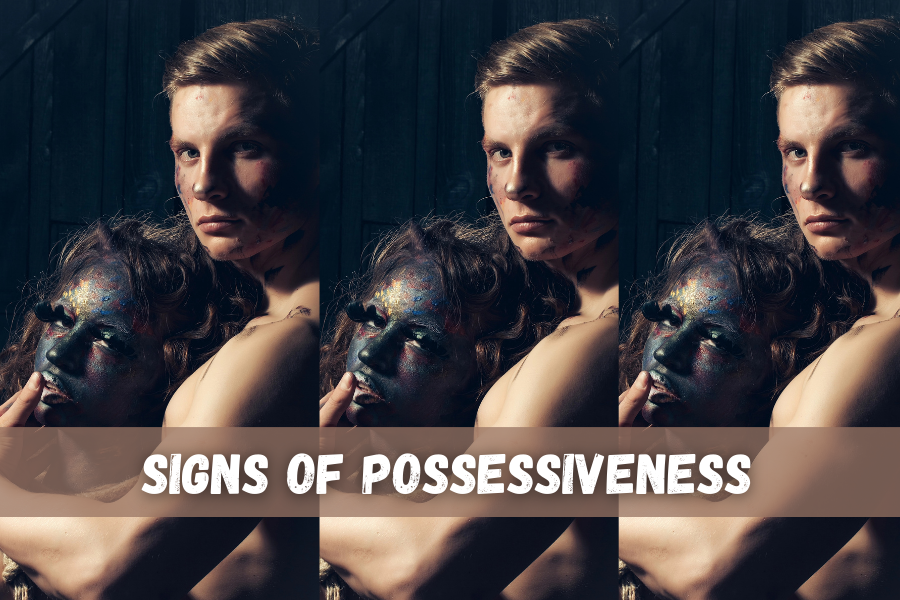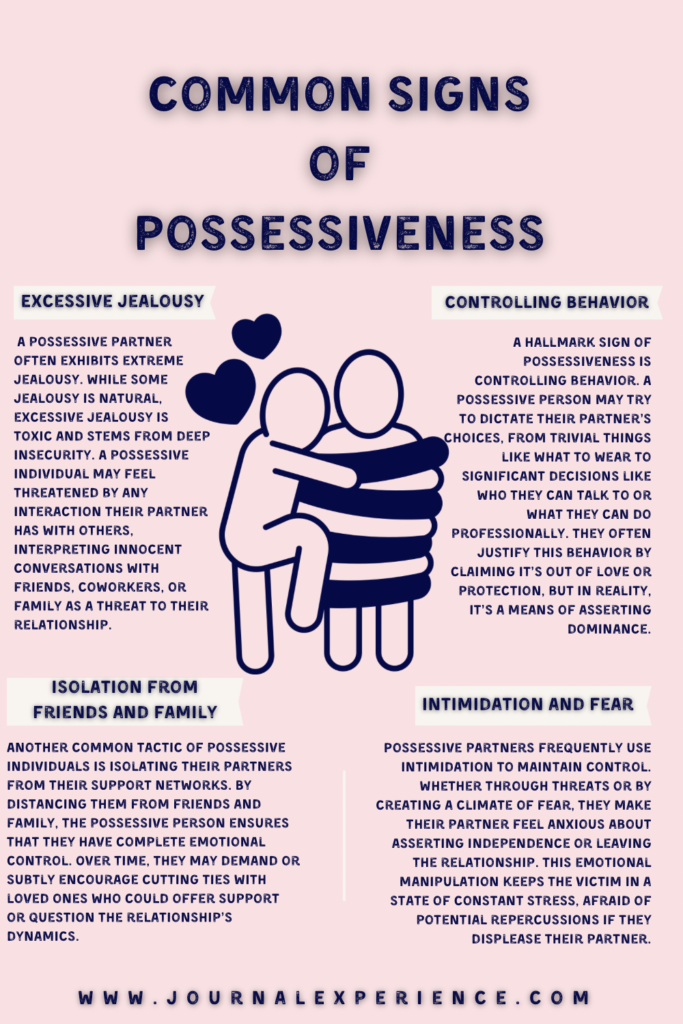Are you concerned about someone in your life who seems overly possessive?
Possessiveness in any form of relationship—whether romantic, platonic, or familial—can be deeply harmful. This behavior often begins subtly and intensifies over time, making it difficult to recognize in its early stages.

This post will explore possessiveness, its underlying causes, and common signs that indicate someone is trying to control you.
Additionally, we will discuss the emotional and psychological consequences of possessive behavior, how to address it in adult relationships, and how to recognize similar traits in children.
Understanding Possessiveness
Possessiveness is more than just jealousy or protectiveness—it’s a complex emotional response that stems from deeper insecurities, including fear of rejection or abandonment
In relationships, possessiveness can manifest as an overwhelming need to control or dominate another person, disrupting the balance of trust and respect.
While some level of protectiveness is natural, possessiveness crosses into unhealthy territory when it restricts another person’s freedom and autonomy.
What is Possessiveness?
At its core, possessiveness is an unhealthy need to dominate or control another individual, often stemming from insecurity, low self-esteem, or emotional baggage from past trauma.
When someone is possessive, they tend to view others as their property, seeking control over their actions, choices, and interactions.
Over time, this behavior can lead to toxic relationships that erode trust, individuality, and freedom.
Why Does Possessiveness Happen?
Possessiveness is usually rooted in emotional struggles such as fear of abandonment or inadequacy.
These insecurities lead individuals to overcompensate by controlling their partner, believing that dominance will prevent them from leaving or seeking connections elsewhere.
Unfortunately, this attempt to maintain control only breeds resentment and destroys trust, creating a vicious cycle of emotional manipulation.
Common Signs of Possessiveness
Possessive behavior is not just an inconvenience—it has far-reaching emotional and psychological consequences that can leave lasting scars on the individuals involved.
It creeps into relationships subtly, making it difficult to recognize until the damage is already done.
Relationships driven by control, jealousy, and manipulation slowly erode the victim’s sense of self-worth, making it difficult to maintain emotional balance or independence.
When possessiveness takes root, it distorts the natural dynamics of relationships, creating an unhealthy environment where fear and emotional abuse thrive.
Identifying the early warning signs is crucial in protecting your emotional well-being. Here are some key signs to watch for:
- Excessive Jealousy – A possessive partner often exhibits extreme jealousy. While some jealousy is natural, excessive jealousy is toxic and stems from deep insecurity. A possessive individual may feel threatened by any interaction their partner has with others, interpreting innocent conversations with friends, coworkers, or family as a threat to their relationship.
- Controlling Behavior – A hallmark sign of possessiveness is controlling behavior. A possessive person may try to dictate their partner’s choices, from trivial things like what to wear to significant decisions like who they can talk to or what they can do professionally. They often justify this behavior by claiming it’s out of love or protection, but in reality, it’s a means of asserting dominance.
- Isolation from Friends and Family – Another common tactic of possessive individuals is isolating their partners from their support networks. By distancing them from friends and family, the possessive person ensures that they have complete emotional control. Over time, they may demand or subtly encourage cutting ties with loved ones who could offer support or question the relationship’s dynamics.
- Intimidation and Fear – Possessive partners frequently use intimidation to maintain control. Whether through threats or by creating a climate of fear, they make their partner feel anxious about asserting independence or leaving the relationship. This emotional manipulation keeps the victim in a state of constant stress, afraid of potential repercussions if they displease their partner.

The Consequences of Possessive Behavior
Possessiveness in relationships often leads to destructive emotional and psychological consequences, deeply affecting a person’s well-being. Below are some common outcomes:
- Emotional Abuse – Possessiveness frequently involves emotional abuse, which can range from subtle manipulation to overt gaslighting (making someone question their reality). This abuse undermines self-esteem, leaving the victim feeling dependent on their partner’s approval and constantly doubting their worth.
- Fear and Loss of Independence – Living in fear is a significant consequence of possessiveness. As the controlling behavior escalates, so does the victim’s fear of upsetting their partner. Over time, this fear erodes the individual’s autonomy, stripping away their ability to make independent decisions. This can impact various aspects of life, such as friendships, career choices, and personal interests, leading to a sense of helplessness.
If controlling behaviors have left you doubting your worth or fearing independence, the Healing The Inner Trauma Child (HITCH) Method provides powerful guidance to reconnect with your voice, rebuild self-trust, and heal emotional wounds at their root.
How to Deal with a Possessive Partner
Dealing with a possessive partner is a delicate process, as this type of behavior often stems from deep-seated insecurities and fear.
If you find yourself in a relationship with someone who exhibits possessive tendencies, it’s important to act early to prevent the behavior from escalating.
Possessiveness can be emotionally draining and isolating, and confronting it head-on requires both strategy and support. While it’s easy to feel overwhelmed or trapped, there are actionable steps you can take to protect your well-being without further provoking the possessive individual.
Dealing with possessiveness often involves addressing difficult emotions and navigating complex relational dynamics, but with the right tools and a commitment to your own mental health, it is possible to reclaim control over your life.
Here are some ways to address the issue:
- Setting Boundaries – The first step in dealing with possessiveness is establishing clear boundaries. This means identifying behaviors that are unacceptable and communicating them directly to your partner. Boundaries might include not allowing them to check your phone or dictate who you can spend time with. However, it’s critical to not just set these boundaries but also to enforce them. Letting violations slide will only encourage more controlling behavior.
- Seeking Support – Possessive relationships can be isolating, so seeking support is crucial. Speak to trusted friends, family members, or a mental health professional who can offer perspective and guidance. Support groups or therapy can also provide the tools you need to stand firm in your boundaries and navigate difficult conversations with your partner.
Rebuilding emotional autonomy after a possessive relationship requires support and structure. The Codependency Therapy | Self Love Recovery Treatment Program offers a clear, step-by-step path to break free from emotional control and rebuild authentic independence.
- Considering Safety Measures – If you feel that your safety is at risk, don’t hesitate to take action. This may include seeking legal advice, contacting a domestic violence hotline, or creating a safety plan to leave the relationship. Remember, your safety and well-being should always be the priority.

Recognizing Possessive Behavior in Children
Possessiveness is not limited to romantic relationships; it can manifest in children as well.
While this behavior is often a normal part of childhood development, it can become problematic if it intensifies or persists. Here are signs to watch for in children:
- Jealousy and Difficulty Sharing – Children may exhibit possessiveness by becoming overly jealous when their siblings or peers receive attention or praise. This jealousy often manifests as difficulty sharing toys, attention, or affection. They may throw tantrums or act out, believing they are entitled to exclusive ownership of people or things.
- Controlling Behavior Towards Siblings or Peers – Possessive children may try to control their siblings or peers, dictating what games to play or monopolizing a parent’s attention. If left unchecked, this behavior can interfere with the development of healthy social skills and relationships.
Understanding how possessiveness develops early can help break toxic cycles. The Webinar: Origins of Codependency and Pathological Narcissism offers eye-opening insights into how early relationship wounds create future struggles—and how healing begins with awareness.
Strategies for Addressing Possessiveness in Children
Addressing possessiveness in children requires patience, empathy, and consistent reinforcement of healthy behaviors.
Children, especially in their early years, are still learning how to navigate relationships, and it’s common for them to exhibit possessive tendencies as they develop a sense of ownership and attachment.
However, if left unaddressed, these behaviors can become ingrained, affecting their ability to form healthy relationships later in life.
As adults, it’s our responsibility to guide them gently toward more cooperative, empathetic behavior.
This process takes time, but with clear limits, positive role modeling, and ongoing conversations about the feelings and needs of others, children can learn to share, compromise, and build stronger, more trusting relationships.
Addressing possessiveness in children requires consistent guidance and positive modeling. Here are a few approaches:
- Model Healthy Behavior – Children often mimic the behavior of the adults around them. Demonstrating respectful, healthy relationships in your interactions will provide positive examples for them to follow. Encourage sharing, cooperation, and compromise within family settings to help your child develop these skills.
- Teach Empathy – Helping children understand others’ feelings can reduce possessiveness. Through conversations, role-playing, or reading stories about empathy, children can learn to view situations from another’s perspective, which can reduce jealousy and controlling behavior.
- Set Clear Limits – As with adults, setting boundaries with children is crucial. Let them know what behavior is acceptable and what isn’t. Be consistent in enforcing these rules to ensure that possessiveness doesn’t go unchecked.
Overview
Possessiveness is a deeply damaging behavior that can destroy relationships and erode an individual’s sense of self-worth and independence.
Whether it manifests as jealousy, controlling actions, isolation, or threats, recognizing the signs of possessiveness is essential in addressing and overcoming these toxic dynamics.
If you find yourself in a possessive relationship, don’t wait to take action. Prioritize your well-being, seek support, and establish clear boundaries.
A healthy relationship is built on trust, mutual respect, and individual freedom—not control or fear.

Subscribe to our newsletter and become a member to gain access to valuable resources, expert advice, and support. Together, we can foster a place where respect is mutually valued and celebrated in all relationships. Let’s build a brighter, more respectful future, one connection at a time.